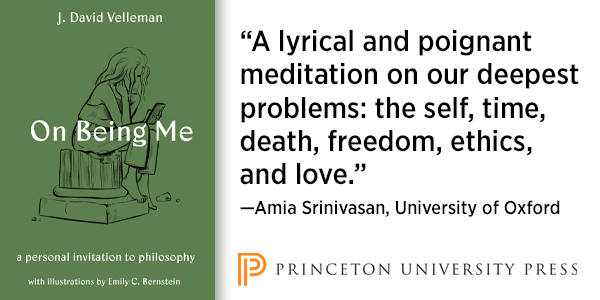Mini-Heap
New links of possible interest to those interested in philosophy…

- “It is an opportunity to think together about the big questions that matter to them” — the New York Times on philosophy instruction for young children during the pandemic
- Mentees interviewing their mentors — a new series at PEA Soup
- The risk of doing moral philosophy — Jason Brennan (Georgetown) and Christopher Freiman (William & Mary) argue that moral philosophers face a deplatforming dilemma
- Philosophers most retweeted by philosophers on Twitter (with over 1000 followers) — also check out the graph, linked at the top, of philosopher retweet relationships
- “How philosophy did and did not prepare me for business” — former philosophy professor Zachary Ernst reflects on his experiences in the private sector
- “When we’re doing things to better our society, the body assumes there’s a society there to better. We’re technically alone, but it doesn’t feel that way.” — dealing with the loneliness of isolation during a pandemic
- The contest to create a philosophical argument that convinces research subjects to donate to a charity has a winner — Eric Schwitzgebel (Riverside) shares it and the way it was assessed
Mini-Heap posts appear when 7 or so new items accumulate in the Heap of Links, the ever-growing collection of items from around the web that may be of interest to philosophers. Discussion welcome.
The Heap of Links consists partly of suggestions from readers; if you find something online that you think would be of interest to the philosophical community, please send it in for consideration for the Heap. Thanks!



At BIOPOLITICAL PHILOSOPHY, I have posted a response to #7 of this Mini-Heap. You will find my response here: https://biopoliticalphilosophy.com/2020/06/23/the-singer-lindauer-entry-won-but-why/
I wanted to comment on the Freiman/Brennan paper linked to here since they write on comment-less blogs, (https://200proofliberals.blogspot.com/2020/06/moral-philosophys-moral-risk-should-you.html)(https://www.google.com/search?q=bleeding+heart+libertarians&rlz=1C1CHBF_enUS868US868&oq=bleed&aqs=chrome.0.69i59j69i57j46j0j46j0l2j69i60.2750j0j7&sourceid=chrome&ie=UTF-8), and I don’t agree with their argument.
If we grant that moral philosophers have a very good chance of getting something serious seriously wrong, there is something like this dilemma, they say: Either philosophers should confine themselves to fairly safe, narrow ground, or should grant themselves, as moral theorists, a special moral license to engage in morally risky behavior. Two things. There’s little reason to think this is a dilemma for philosophers, in particular or alone. And it’s a false dilemma.
(1) Philosophers don’t have an outsized role as cultural influencers and are rarely on the front lines of ethical controversy, it seems to me. So, why do they – as opposed to literally everyone – have uniquely to face this dilemma about taking positions on moral issues. Indeed, one would think that philosophers as academics who largely argue with other academics (in an institutional setting specifically set off from society in general (where they are granted legal, if not moral license to take risky positions (by “academic freedom”))) would, thereby, be more removed from the immediate consequences of academic arguments that they make in lecture halls to a few dozen students and journals read by a handful of people, than others. But once you see this is not specifically a dilemma for philosophers, the false dilemma is more evident.
(2) What could people possibly do other than “…confine themselves to fairly safe, narrow ground, or… grant themselves…a special moral license to engage in morally risky behavior”? Well, they could (a) lean towards safer, narrower grounds when (i) addressing people outside the academy and/or (ii) on topics of obviously immediate consequences and/or (iii) where they are perceived to have special authority. (Just to be clear, above I meant to specifically deny that on most topics, in most contexts, moral philosophers have special authority. You may disagree, obviously.) Feel free to add more conditions than these three. They almost surely exist. Or reject some of these. The point is that people could also, simultaneously, in some contexts (b) engage in an argumentative free-for-all is all, flirting with all positions (even disturbing, offensive ones).
I don’t want to be uncharitable, maybe, I’m missing something, but it seems like the authors think they discovered the idea that we have a responsibility to be more cautious in some contexts (and some debates) than in others. This is not new. And it’s not a dilemma. It’s a balancing act.
I would also love to hear what Brennan, or others, think about this argument in relation to his book “Against Democracy”. It seems to take a potentially offensive and dangerous position on a life-and-death topic at a time (the Trump era) when democracy is in special peril. And, I think, it’s aimed at a wider audience than most philosophy books. (See, coverage by The New York Times, for example.) Has he granted himself moral license to engage in morally risky behavior or does he think of arguing against democracy as remaining on fairly narrow safe grounds? (He might think that, for example, he is carrying-on on the long history of libertarians against democracy, and so is conservative relative to his libertarian peers.)